The Russo Brothers: Clevelanders for life
Interviews Home / Movies Home / Bullz-Eye Home
Jamey Codding recently sat down to chat with Anthony and Joe Russo, the writer/director team behind "Welcome to Collinwood," a new film from Warner Bros. starring George Clooney and William H. Macy, set to open in select theaters on October 4 and nationwide October 18. Among other things, the Russo brothers (pictured below; Joe on the left, Anthony on the right), originally from the Cleveland area, talk about their recent success, their relationship on the set, and the future for the Browns and the Indians.
Click here for Jamey's review of "Welcome to Collinwood."
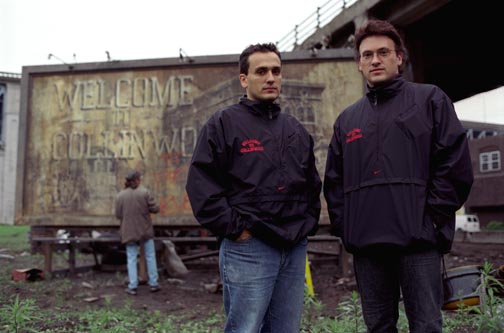
Jamey Codding: So what, in your minds, separates "Welcome to Collinwood" from other heist films?
Joe Russo: Well, for us this is a throwback film. I think it's a style of movie that people haven't made in a long time -- it's based on '30s and '40s American comedies like "The Bowery Boys" with Huntz Hall and Leo Gorcey. It's a very broad, innocent, slapstick-style of humor.
Anthony Russo: It's the kind of stuff you used to watch on "The Late Show" growing up.
JR: It's even a little derivative of "The Little Rascals" in some respects. Definitely, it's not ironic like a lot of heist comedies tend to be. It's trying to go to the other extreme.
JC: I see George Clooney ("Jerzy") and automatically my mind goes back to "Ocean's 11," and I wonder if he's going to start being typecast as a thief.
AR: It's kind of funny because he got to play the anti-Danny Ocean in this movie. He's the junkyard dog of thieves in this movie where in [Ocean's 11], he was the James Bond thief.
JC: Bill Macy ( who plays "Riley") said it's a movie about, "the losers in this world who get their shot…" which is one of the things that attracted him to the script. Luis Guzman ("Cosimo") also said, "It's a bunch of guys who just can't quite get it right." Are these a couple of the themes that will be the driving forces for this film in terms of popularity, perhaps something that the "everyday man or woman" can relate to?
AR: We really identify with it.
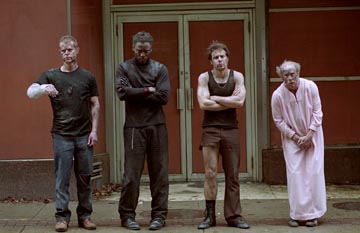 JR: These characters are underdogs, the lovable losers. I think everybody, to some degree, thinks of themselves as an underdog.
JR: These characters are underdogs, the lovable losers. I think everybody, to some degree, thinks of themselves as an underdog.
AR: Especially in Cleveland, in a neighborhood like Collinwood that has had a lot of bad breaks over the last few decades.
JR: Cleveland couldn't have any more worse breaks.
JC: Especially if you start talking about sports.
JR: Oh yeah. One out away from [winning] the World Series. The Fumble. The Drive…. We tore our hair out. We always say that [the 1997] World Series was the classic example of Cleveland in terms of…you had a phenomenally talented team with a lot of heart that drove its way all the way to the World Series…
AR: It was built so carefully….
JR: …and it was beat on the last out in the ninth inning by a team (the Florida Marlins) that was bought and paid for and dismantled the next season.
AR: You couldn't have had a more ignoble opponent to be [defeated] by. (Laughs)
JC: Sam Rockwell ("Pero") called "Collinwood" an "edgy fairytale" and compared it to "Pulp Fiction" or "Raising Arizona," kind of a dark comedy in many ways. I got that same kind of feeling just from the trailers and clips I saw -- actually, it reminded me a lot of "Snatch" too. Do you agree with those comparisons?
AR: A little bit. We would focus more on the differences between our movie and those because, the thing is, "Pulp Fiction," for instance, is very self-conscious -- it's constantly referencing to itself as a movie and "Collinwood" is the opposite. It actually is never aware of itself as a movie. Everything is very straightforward in this movie…. It's grounded in a sort of realism, in a way, even though it's a stylized realism. The same thing with "Snatch" -- that has a lot of irony to it. "Collinwood" doesn't. We wanted to do something that was completely irony-free because we saw a trend developing in the '90s with the rise of the Indie movies, and we were part of that trend for a while. Our first film ("Pieces," 1997) is of course a very ironic, self-conscious film, but I think we kind of felt like that form of storytelling ran its course, for ourselves at least. We wanted to do something that was a polar opposite, so we began to look farther back into cinema history for models that were straightforward, more honest, more open, more simple. We thought it was a challenge to ourselves to try to make a movie like that. That's what "Collinwood" is for us.
JR: There's a lot of slapstick in the film -- the last 25 minutes of the movie are just ridiculous.
AR: But the characters never, ever, ever play it as ridiculous. No one ever plays it for a joke. All the actors approach their characters with complete emotional honesty. The situations are ridiculous and absurd and funny, but the characters are completely unaware of that humor.
JC: Several people involved with the movie, including you guys, referred to "Collinwood" as a "fable." How so? People tend to think of fables as stories with morals -- what's the moral of "Collinwood"?
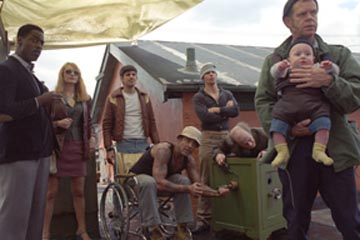 JR: There's a real simple theme in this film, again going backwards trying to do a throwback film. We wanted "Collinwood" to be very clearly simplistic, very rudimentary almost in its presentation. It's about one theme, and the theme is a moment of connection between the characters. They're chasing something physical, some kind of physical reward throughout the whole movie, and they end up having to look inside themselves at the end of the film to find something of value in this one moment of connection. To us, that's how it's a fable -- they chase one thing and find what they were truly looking for.
JR: There's a real simple theme in this film, again going backwards trying to do a throwback film. We wanted "Collinwood" to be very clearly simplistic, very rudimentary almost in its presentation. It's about one theme, and the theme is a moment of connection between the characters. They're chasing something physical, some kind of physical reward throughout the whole movie, and they end up having to look inside themselves at the end of the film to find something of value in this one moment of connection. To us, that's how it's a fable -- they chase one thing and find what they were truly looking for.
JC: You also talk repeatedly about this being an "ensemble piece," that there's no real lead in the film. Was that more because of the script or because of the talent of the actors involved with the movie?
AR: It was by design of the script because again, it had more of an old-school feel to it. The thing is, the story is about a bunch of people who are facing a lot of hardships, and the fact that they find, at the end of this film, a moment of solace with one another in that hardship. To tell that story you really have to get the audience to invest in each individual character and really…appreciate each character's story and each character's isolation and each character's problems in order for them to have a moment where they all kind of provide a connection for one another. It was the DNA of the film -- that's the story. It's a story about a group of people and what happens to them as they go through this experience together.
JC: I think it's really great to see someone take the writing aspect of the film just as seriously as the visual aspect of the movie.
JR: Well, we came to it through the writing. I went out to Iowa and studied English, took a lot of writing courses, and we'd always written a lot -- the word was really important. We analyzed guys like Tennessee Williams and David Mamet, [and] theater was a huge influence on us as well.
JC: And what you've said about character development is great because I've always felt like, whether you're talking about writing, film or theater, character development is one of the most important aspects of any story and that some writers or directors don't feel the same way. I can tell, from what you're saying and from what I've seen of "Collinwood," that you took extra care to fully develop each one of your characters.
JR: It was critical to us. We thought the movie would be funnier if you cared about these people -- you get bigger laughs when you're behind the characters, and you feel awful for them when at the same time you can't help but laugh at them.
JC: Kind of like how you'd maybe laugh at a family member who does something stupid?
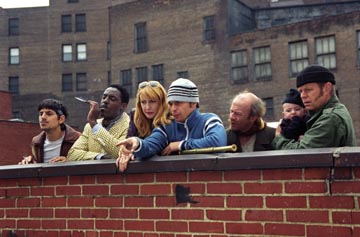 AR: Yeah, exactly. And you referenced in your earlier question what the cast's role was in this ensemble and that was critical in terms of pulling off the ensemble. We knew we had to find great, great actors because you've got to find people who can give life to a character that isn't a central character and that's not going to have the screen time of a central character, and who can really develop a full, well-rounded character functioning sometimes peripherally in an ensemble. That was really important to us, and the actors we went after were extremely well-trained, many of them with stage training…just great actors. We wanted the best actors out there [and] we were really fortunate.
AR: Yeah, exactly. And you referenced in your earlier question what the cast's role was in this ensemble and that was critical in terms of pulling off the ensemble. We knew we had to find great, great actors because you've got to find people who can give life to a character that isn't a central character and that's not going to have the screen time of a central character, and who can really develop a full, well-rounded character functioning sometimes peripherally in an ensemble. That was really important to us, and the actors we went after were extremely well-trained, many of them with stage training…just great actors. We wanted the best actors out there [and] we were really fortunate.
JC: I noticed that, while I recognized most of the names in the cast, I couldn't necessarily pinpoint what I'd seen them in. I knew they'd been around for a long time and had done some great work, but aside from George Clooney and Bill Macy, the names aren't big but it seems like the talent certainly is.
AR: Yeah, they've been kicking around, doing great work, though they haven't really broken into that public consciousness level yet….
JC: Why was it so important to film in Cleveland? Were you simply looking for authenticity, or was it more about hometown loyalty in a way?
JR: It was about all of that. Certainly we love this town, we grew up here on 127th and Woodland so we're exceptionally loyal to this town like all Clevelanders are. We all kind of went through hell together, we've all kind of been made fun of together. I think there's a certain sense of camaraderie and coming back here, yeah, there was a serious question of loyalty because the story's set here and it's told here. There's also a serious question of authenticity -- we couldn't tell the story anywhere else. It's part of who we are and how we grew up and the memories that we have. It was critical that the film was shot here.
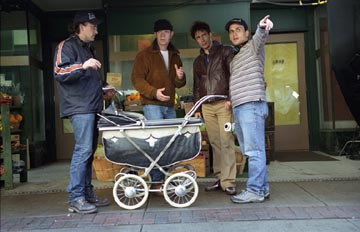 AR: I think we design our stories the way we do and set them in Cleveland -- we have a whole range of stories that we have set here -- for that reason. This place is important to us. So shooting here has two appeals to us: Number one, it serves the story because it's really about the essence of different facets of life in this city and then at the same time, the experience of making a movie is as important to us as the movie itself. To be able to shoot here around all of our family and friends, people we love and have come to know and care for over the years -- that is so very fulfilling to us, to be able to share that experience with them and go through it with them.
AR: I think we design our stories the way we do and set them in Cleveland -- we have a whole range of stories that we have set here -- for that reason. This place is important to us. So shooting here has two appeals to us: Number one, it serves the story because it's really about the essence of different facets of life in this city and then at the same time, the experience of making a movie is as important to us as the movie itself. To be able to shoot here around all of our family and friends, people we love and have come to know and care for over the years -- that is so very fulfilling to us, to be able to share that experience with them and go through it with them.
JC: Do you intend to film here as often as possible?
AR: Yeah, it's a big part of our agenda and we've been working very closely with the Cleveland Film Commission. Chris Carmody (CFC president) sort of reinvented that organization a few years ago and it's one of our great blessings that he did. What they're doing is they're trying to create, which is a very difficult thing to do, kind of an infrastructure here. But that doesn't necessarily mean only physical things; that also means kind of an attitude and an understanding in the city and the way politics work and the way permitting is structured and the way police work is handled to support and be really conducive to film making. We just look forward to continuing to develop that kind of infrastructure in town and expanding it. We've had a decentralization of the film industry over the past 10 or 15 years, and you see regional centers kind of popping up. We saw Pittsburgh go through a really productive phase and, even more so, cities like Baltimore and Austin -- there are TV shows being shot in Baltimore, the whole series, and in Austin they donated their old airports and all their old hangars they converted into sound stages. They did $140 million of business last year in sound stages. Typically, what you find with these places is…a local filmmaker who is a catalyst for the growth of filmmaking in the area. Baltimore had Barry Levinson…and Austin's got Robert Rodriguez and Richard Linklater, and we would love it if we could play a similar role here in Cleveland.
JC: We're a Web site with a heavy sports flavor and we already know you're both sports fans. What do you think about the Indians and Browns this year?
JR: Well with the Indians, it's like a fire sale. They're just giving people away. If I had 20 bucks I could probably buy [Jim] Thome. They're stocking the farm system, but that's the problem with baseball in general -- you've got the New York Yankees functioning like an All-Star team. They have enough money to buy anybody because they have the TV market to do it.
AR: Essentially the farm systems end up feeding the Yankees.
JR: Sense of fairness is out the window with baseball, and so then you get stuck with the Tribe, when they build up a team, they get enough great-caliber players that, if they're around too long we've got to give them away because we can't afford their salary and [instead] we start over again with a farm team. Then you've got to wait around another five or six years for guys to come up. By the time we're 70, maybe we'll get lucky again and we'll make it to the Series. (Laughs) The Browns, they're an excellent team and they could be 3-0. They're rough around the edges but they have massive potential. I think…they've got a great slew of receivers and Tim Couch -- one of the best things to happen to anybody is to be tested, to have somebody give you a competitive challenge and I think [Kelly] Holcomb did that. Couch is going to show his true colors; the guy's a leader, he was a great ball player in college. We can't lose either way with Couch or with Holcomb. [But] you have to back [Couch]. Look, the guy's been taking hits for the last three years without a team around him. Now he's finally got a team around him, you can't take the ball away and give it to the backup. I know Holcomb's got great potential but what sense of loyalty is there in that?
JC: Any sports movies in the future for you?
AR: There's actually a baseball movie that we've been toying with. It's not a script that we wrote and it's something that we tried to get ourselves involved with but it's a tough one because it's a high-profile project. But also, a sports angle [for "Collinwood"], even though it's an ensemble you can kind of focus in on a lead in Sam Rockwell's character -- he plays a boxer.
JR: Not a very good boxer. (Laughs)
AR: He trained right here at Murray Hill…for the role.
JC: Isaiah Washington ("Leon") said, "It's almost like a left brain and a right brain: one's very poetic and one's very visual" when talking about working with you two. Who's who in that comparison?
JR: We don't know -- he never let us know who that was.
AR: Coming from Isaiah, he could've just been talking about something else….
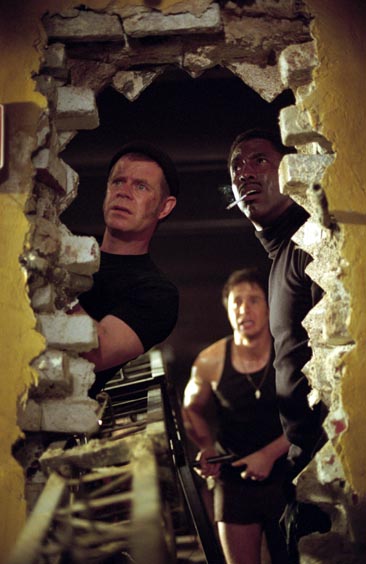 JR: I think we're both a little of each.
JR: I think we're both a little of each.
JC: Do you guys butt heads often, maybe step on each other's toes on occasion because you may have slightly different visions or ideas in the writing process or on the set?
AR: We're very passionate about movie making and we're very passionate about the stories we tell, so yeah, we get very passionate with one another. Fortunately, we're always able to find a synthesis in our feelings and in our concepts that ends up expressing itself in a way that…we both kind of equally love.
JC: It seems like you guys are on the verge of "making it" officially.
JR: Cross our fingers, but it seems that way.
JC: How do you think your story can inspire other young and possibly struggling writers or directors?
JR: It shows you that anything can happen. I think there was a combination of two things that got us to where we are: perseverance and tenacity, combined with a little bit of luck, being in the right place at the right time. But without the perseverance and tenacity…you make your own luck -- you've got to work for it and get yourself into a position where, when the breaks happen, you've got the material to show that you can do what you need to do.
AR: We were inspired by people that came out of places with stories to tell. We saw people doing it before us -- you have Robert Rodriguez and Gus Van Zant or Wes Anderson or whoever it may be. Hopefully, people can look at us and find the confidence, the faith, the belief that they can pursue the same goals.
JC: All of those tattoos on George Clooney -- real or phony?
JR: You know the ink they use on meat, they stamp it? They used that same ink -- it's a new technique they came up with.
AR: There was a tattoo artist working on "Ocean's 11" with Brad Pitt, and this guy just came up with this idea to start using this sort of ink. And what it allows him to do, of course, is you can do a much more elaborate tattooing process because it stays longer. Normally with the old inking process you used to use, you'd have to reapply it everyday. Well, you can't reapply wrist-to-neck, all upper-body tattoos, everyday -- you'd be in the chair for six hours. So he got the job done over the course of several days and it stayed with him for the week of shooting. It was kind of a fun thing because you don't normally see that because the technique hadn't really been in place before.
JC: What can we expect to see from the Russo Brothers in the near future?
JR: Oddly enough, just before we got on the plane to come out here we ended up closing a deal with Steven [Soderbergh] and George [Clooney] to do another Cleveland-based film, much higher budget that could reach as high as $40-$50 million. We're in the process of working out the deal with the studio so we have to be a little mum about it but it's a Cleveland-based film [and] it's comedy/drama.
You can follow us on Twitter and Facebook for content updates. Also, sign up for our email list for weekly updates and check us out on Google+ as well.











